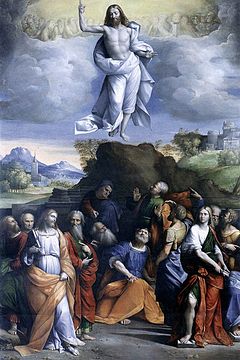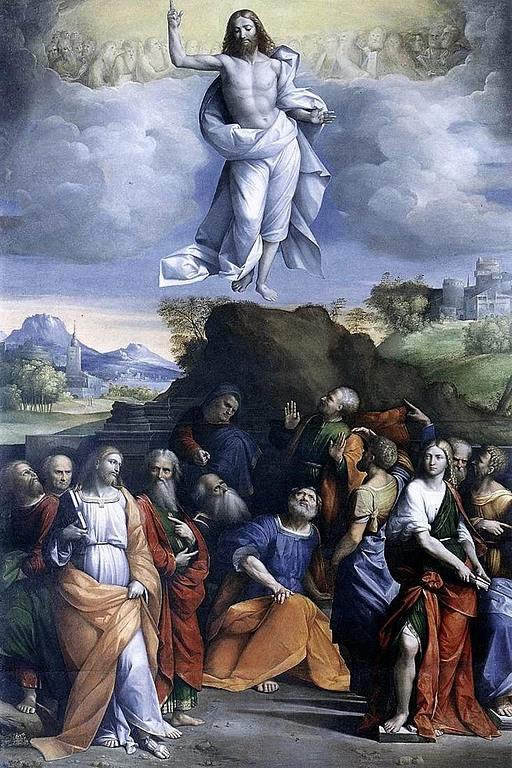 Central Idea: Jesus Christ is now our High Priest in heaven. Doctrine: The Ascension. Practical Application: Confidence that we can reach heaven.
Central Idea: Jesus Christ is now our High Priest in heaven. Doctrine: The Ascension. Practical Application: Confidence that we can reach heaven.
To view the readings for Lectionary 58 click here.
Central Idea: Jesus Christ is now our High Priest in heaven.
Acts 1:1-11
- In the forty days between Christ’s Resurrection and Ascension, he appeared many times to his disciples and Apostles, showing them he was alive and teaching them.
- He promised to send them the Holy Spirit. Then they were to be his witnesses throughout the world, beginning in Jerusalem.
- Then he was lifted up into heaven and a cloud took him from their sight.
Ps 47:2-3, 6-7, 8-9
- It seems built into human beings to admire and honor their leader. Presumably, there is a reason he got to the position he has reached.
- It is also right to be skeptical about leaders. It is just as likely that they are cynical, unjust, power-hungry thieves as that they are prudent, just, courageous, and strong heroes.
- But Jesus Christ our King and Lord is supremely worthy of our honor. He is the sum total of every good quality that has ever been or could ever be found in a human being. He has done great, heroic deeds to get where he is. And good King that he is, Christ uses his powers only to benefit us.
- So while it is appropriate to honor the office and to salute the rank of those over us here on earth, it is usually foolish to actually glorify them, unless they have really done something worthy of this adulation.
- But with Christ, it is right to be joyful in his presences and to give him thanks and praise as the Psalm indicates. It is right to give him latria, or the worship due to God.
Heb 9:24-28; 10:19-23
- The author of the Letter to the Hebrews gives us complicated but valuable doctrine. He draws parallels between the Temple of Jerusalem and the Jewish high priest and heaven and Jesus Christ.
- In the Temple of Jerusalem was the sanctuary where the Ark of the Covenant was kept. Once a year, the high priest entered this Holy of Holies and sprinkled blood from a sacrificed animal on behalf of God’s people for the forgiveness of their sins.
- Through his Ascension, Christ our High Priest enters heaven, the true sanctuary of which the earthly one in Jerusalem is just a copy. There, Christ offers his sacrifice to God the Father for our sins.
- As our high priest in heaven, Christ is ever ready to intercede for us so we can obtain forgiveness of sins and everlasting life.
- We can enter Christ’s sanctuary by way of his flesh and blood with bodies washed clean with water. In other words, salvation comes to us through the Sacraments of Baptism and then the Holy Eucharist.
Lk 24:46-53
- Christ’s own mandate was that his Church, through the assistance of the Holy Spirit, would preach to the world everything he had done and taught, especially his Death and Resurrection and the necessity of repentance for the forgiveness of sins.
- But the Church is no abstract entity. Only concrete human beings can be Christ’s witness on earth. This duty to evangelize belongs to every follower of Christ. Today the duty falls with bishops, priests, and deacons. It also falls on the laity: every one of us.
Doctrine: The Ascension
- In the Nicene Creed we will proclaim what we just heard: Our Lord “ascended into heaven and is seated at the right hand of the Father.” What does it mean to “ascend into heaven” and to be “seated at the right hand of the Father”?
- Christ’s body was glorified at the moment of his Resurrection. But when he appeared afterwards to his disciples, he kept his full glory veiled. Now Christ enters heaven where his full glory shines forth. On the road to Damascus, St. Paul got a glimpse of this post-Ascension glory. (CCC 659)
- Christ’s Ascension or going up to heaven completes his Incarnation or coming down to earth. Christ has opened the way to heaven for us. (CCC 661). “Jesus Christ, the head of the Church, precedes us into the Father’s glorious kingdom so that we, the members of his Body, may live in the hope of one day being with him for ever” (CCC 666).
- By ascending from earth to heaven, Christ did not just open a way for us to follow as best we can. Christ promised his disciples, “And I, when I am lifted up from the earth, will draw all men to myself.” His lifting up, first on the cross, then from the dead, and now by his Ascension, begins his work as eternal priest of the new and everlasting covenant. He “entered, not into a sanctuary made by human hands … but into heaven itself, now to appear in the presence of God on our behalf.” There, Christ permanently exercises his priesthood, for he “always lives to make intercession” for “those who draw near to God through him.” (CCC 662) “Jesus Christ, having entered the sanctuary of heaven once and for all, intercedes constantly for us as the mediator who assures us of the permanent outpouring of the Holy Spirit.” (CCC 667)
- Why is Our Lord “constantly” exercising his priesthood on our behalf? Shouldn’t he be “done,” having accomplished our salvation? Perhaps there are two reasons.
- Each of us, during our earthly lives, is living out the drama of our own salvation. We need Christ’s help along the way.
- In addition, new human beings are born into the world every day. Every generation is a new crop of men and women. Each will need Christ’s help to find salvation or not. Christ is drawing all men to himself until his Second Coming. Sadly, all men, to some extent, and some men, to a great extent, resist this attraction.
- “By ‘the Father’s right hand’ we understand the glory and honor of divinity, where he who exists as Son of God before all ages, indeed as God, of one being with the Father, is seated bodily after he became incarnate and his flesh was glorified.” (CCC 663)
- “Being seated at the Father’s right hand signifies the beginning of the Messiah’s kingdom, the fulfillment of the prophet Daniel’s vision concerning the Son of man: ‘To him was given dominion and glory and kingdom, that all peoples, nations, and languages should serve him; his dominion is an everlasting dominion, which shall not pass away, and his kingdom one that shall not be destroyed.’” (CCC 664)
Practical Application: Confidence that we can reach heaven.
- Christ ascended into heaven.
- He opened the way for us to get there.
- There his glory is fully revealed.
- There he acts as high priest of the New Covenant.
- There he draws all men to himself.
- Can anything be “done” with the doctrine of the Ascension? Is it just a collection of related truths to be believed, doctrines that can’t have any impact on our lives? No. These realities can affect our lives positively. The author of the Letter to the Hebrews tells us how:
[S]ince through the blood of Jesus we have confidence of entrance into the sanctuary by the new and living way he opened for us through the veil, that is, his flesh, and since we have “a great priest over the house of God, “let us approach with a sincere heart and in absolute trust, with our hearts sprinkled clean from an evil conscience and our bodies washed in pure water. Let us hold unwaveringly to our confession that gives us hope, for he who made the promise is trustworthy.
- Words like confidence, absolute trust, and hope can become real to us. Christ is. He is in heaven. The way he has opened to heaven is himself. It is made concrete on earth through his Church. His Sacraments can get us there. We will be able to be there with him soon.
- The Apostles and hundreds of other followers of Christ saw the risen Lord. The Apostles saw him ascend into heaven. They were certain that he was in heaven acting on their behalf, drawing people to himself for their salvation.
- We are those, on the other hand, who are blessed because we have not seen and yet believe (Jn 20:29).
- We can say to him, Show me that you are and that you care. Make it clear to me that you really are on that far-end of the way. The heaven-side of the way.
- We who are on the earth-side of the way can also say, “I’ll do my part,” and do it. I’ll talk to you in prayer. I’ll worship you in the Mass. I will receive you in the Eucharist. I will struggle every day to do your will, including living the moral life you demand, and go to Confession to deal with my failures. I will try to be like you, going about doing good (Acts 10:38).
- If we do this, according to the testimony of the saints, pretty soon Christian confidence, trust in Christ, and hope become real.

Leave a Reply